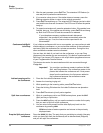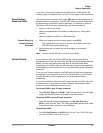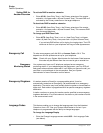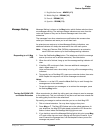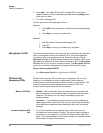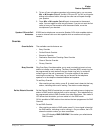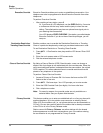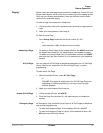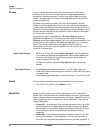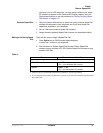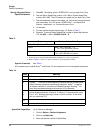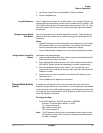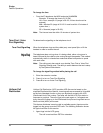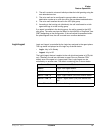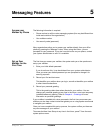
IPedge
Feature Operations
58 TOSHIBA
IPedge UG 06/11
Privacy Privacy controls the ability of more than one person to use the same
extension at the same time. Privacy applies to multiple appearances of
extensions, Phantom extensions, outside Lines, and outside Line Group
buttons. The application of Privacy to individual telephones is controlled in
system programming.
By default, the system is private. If you are in a conversation, another
telephone with an appearance of the line on which you are talking cannot
intrude unless that telephone has been programmed for Privacy Override. In
that event, the other telephone may enter and leave the conversation at will. If
all users are provided with Privacy Release in Class of Service, the system
will function as non-private.
Your telephone may be equipped with a Privacy Release and/or a
Privacy on Line button. On a normally private telephone, Privacy
Release allows other appearances of your line to join the conversation. On a
normally non-private telephone, Privacy on Line allows you to exclude
others. The Privacy condition may be toggled at any time during a
conversation. At the end of the conversation, the line’s privacy condition
returns to its original state.
Use Privacy Release • While on a CO line call, press Privacy Release. The LED lights red.
The outside line flashes at all appearances. When another station user
enters the outside line call by pressing a common outside Line, the
Privacy Release LED turns Off.
• To add a third station, press Privacy Release again; the process
repeats.
Set/Cancel Privacy • Press Privacy on Line to set privacy. The LED lights steady red.
Others are blocked from entering your outside line calls when they press
a common Line.
• Press Privacy on Line again to cancel the feature. The LED turns Off.
Redial Use this button to redial the last number dialed from your telephone.
•
To redial the last number, press Redial or
*
0.
Speed Dial Speed Dial (SD) enables you to dial a sequence of up to 32 digits with a
shorter code. Dial sequences can include telephone numbers, authorization
codes, passwords feature activation codes, and pauses. Speed Dial may be
used to originate a call or invoked after a call is established. There are two
types of Speed Dial:
•
System SD – All telephones in your system can share a list of up to 800
System Speed Dial numbers under the exclusive control of the System
Administrator. In some cases, System Speed Dial enables you to reach
numbers that you would not be allowed to dial directly from your
telephone.
•
Station SD – Your System Administrator allocates a block of up to 100
personal SD numbers (10 per telephone). You have exclusive use of
them and you can create and change them from your own telephone. If



